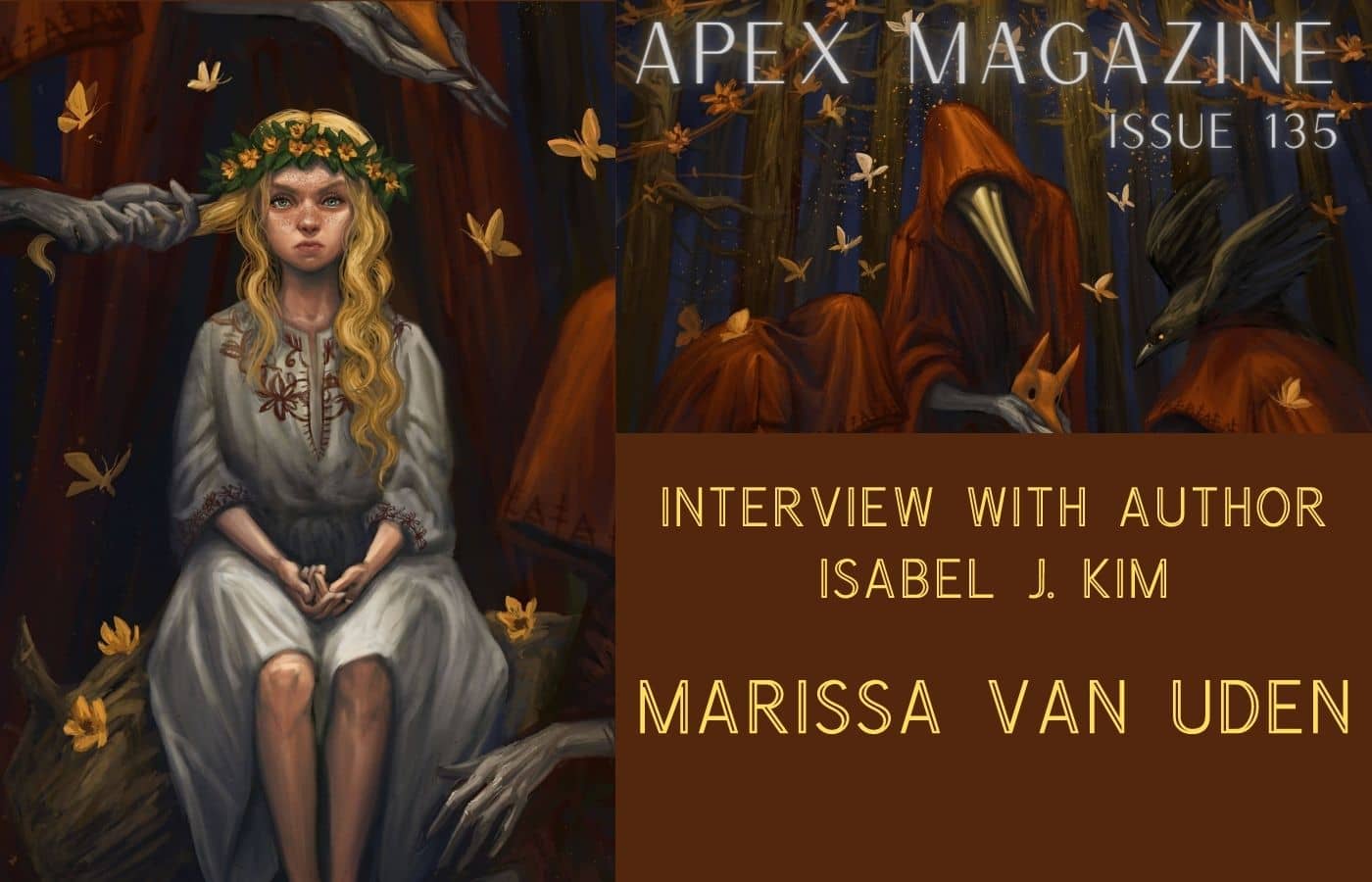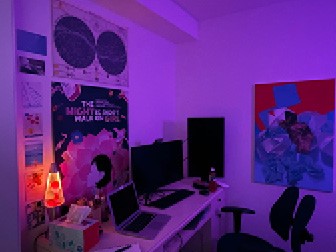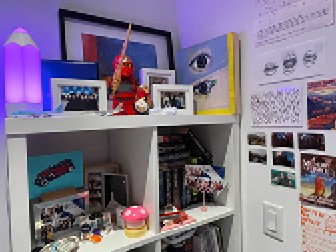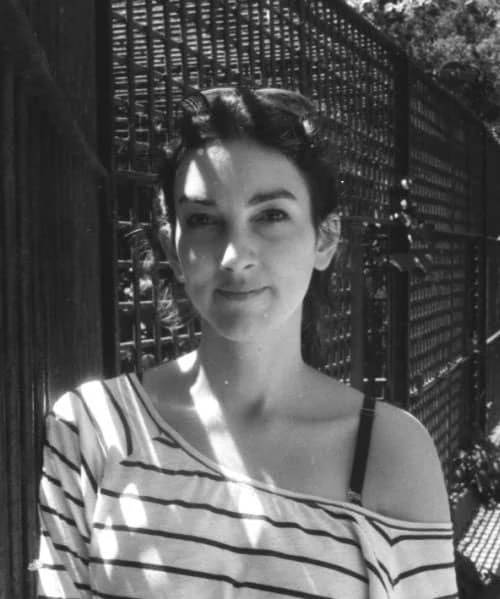
In “The Big Glass Box and the Boys Inside”, Adair takes what he thinks is a temporary summer associate job at Grey & Tender, LLP, a firm known for offering bargains that make it hard for people to leave. But Adair has no fear of being trapped by his extradimensional employer, because there is nothing he wants except for the company experience to put on his resume; therefore, there’s nothing they can offer him and he’ll be free to walk away. However, what he doesn’t expect is to fall in love with a colleague, who he comes to care about even more than himself. This story is about all the truths we hide, and what it means to live the life we want, and at what costs.
Isabel J. Kim is a Korean-American speculative fiction author with works in Clarkesworld, Lightspeed, and Strange Horizons, among others. Her work has appeared on the 2021 Locus Recommended Reading List and her short story “You’ll Understand When You’re a Mom Someday” won a 2021 Shirley Jackson Award.
She has a JD and a BA from the University of Pennsylvania. When she’s not writing, she’s co-hosting Wow If True, a podcast about internet culture, or doing legal stuff in a big glass box in Midtown Manhattan.
Marissa van Uden: Thank you for joining me to talk about this beautiful and wholly unique story! At its heart, this is a relationship story, and I loved how grounded the relationship was in the beauty of the imperfect, gritty, day-to-day details of real life, all grease stains and cute awkward moments in an unworldly setting full of tainted miracles. It made the relationship feel so precious and authentic, even if it doesn’t last forever. Did you consciously set out to contrast their very human relationship with the cosmic wonder of the workplace?
Isabel J. Kim: You nailed it! The rule I follow is that the more expansive in scope a concept or setting is, the more personal the story needs to be—if you’re going to go big, go intimate. That’s why a lot of my more conceptual stuff ends up being love stories or family stories.
Once I realized the shape of the narrative here, I deliberately leaned into the contrast between the slick, perfect, inhuman miracles the firm offers, and the messy, human, stuttery beginnings of a relationship that can only exist outside the firm. A perfect, unreal, sure thing, contrasted against an authentic, miraculous, uncertain thing.
MVU: Another contrast I really appreciated in this story was between the two characters themselves. One who wants nothing, and one who wants something so badly he’ll grasp for it even if it’s only temporary. Which character came first during the creation of the story, and how did they (or the relationship) evolve over various drafts? Or did you know both characters well before starting to write?
IJK: Adair came first, and he started as the question of “What personality would have the arrogance to walk into a fae court and think he could get out unscathed?” And then I thought, “Ah, of course, the man just wants a line on his resume. He thinks he’s different because he doesn’t want anything material from the fae.”
Finn appeared after, when I began thinking about who Adair needed as a contrast. Of course Adair needed someone who wants something and is willing to give up the rest of their life and humanity to have that one thing. I knew exactly who Finn was when he got in the freaky space elevator despite being scared of heights. I didn’t figure out he was trans until halfway through.
And I didn’t realize until the end that Finn was braver than Adair—I rewrote the ending three times before landing on the current iteration, after I realized that Adair had arrogance, but this story is about the first time in Adair’s life that he’s ever been truly scared of gaining or losing something.
I figured their relationship out on the page—the one thing I was sure of was that these guys were not yet in love, because they didn’t really have the time to fall in love (that’s the problem with short stories sometimes, it’s a compressed space to write complex relationships), but they contained within them the possibility of love; and that they found aspects of each other really interesting. So, Finn ended up characterized quite a bit by what Adair finds interesting and scary—vulnerability, emotions, having a goal and being willing to sacrifice everything for it. Meanwhile, Adair ended up characterized by being the sort of guy who lies to himself a lot about how he feels and about how much of an asshole he is—he thinks he’s cutthroat, but he’s really not.
I’m awfully fond of who these two guys turned out to be.
MVU: I’m so fond of them too! They’re such nuanced characters.
You’re a lawyer for your day job and describe yourself as working in “a big glass box,” just like our characters in this story. So of course I’m curious if there were any particular details from your day job that directly inspired either the story or setting. (And do you have a view of galaxies and nebulae from your office? I’d love to think so.)
IJK: So the disclaimer I need to give is, I cannot stress this enough, this story is not what my job is like, this is not what my coworkers are like; everything about that is made up except to the extent that working in corporate environments requires a social skill set that is a little adjacent to existing regularly in the world, and the fact that large law firms demand a different sort of time commitment than a regular nine-to-five (Hi, anyone from work reading this!).
But. I pulled some pretty specific details: the imagery of the glass buildings is directly pulled from the office I work in (and, generally, the glass buildings in Manhattan), and the elevator being freaky is pulled from the fact that every big law firm I’ve been to has had weird elevators. I’m also the one scared of heights, which is why Finn gets that fun little character trait. I also pulled the free food and drinks from my experience of working in corporate America—have you read Free Food for Millionaires? I always think about that when I get free food at work. And the free snacks were a little detail that tied nicely with the idea that if you eat the food in the fae realm, if you eat the pomegranate in the underworld, you’re trapped. Which is how I feel when I use the office coffee machine—just kidding.
My office building has a very nice view of Bryant Park, but alas, no nebulae.
 The double monitors are for work, the laptop is for writing, and I painted the oil painting in the back. Don’t ask me why the tajin is there.
The double monitors are for work, the laptop is for writing, and I painted the oil painting in the back. Don’t ask me why the tajin is there.
MVU: Ah, I’m so delighted to hear these details sparked the setting details! So, I’mgoing to go out on a limb here and assume you are a really busy person. Do you use any particular kind of schedule or writing rituals to make sure you can carve out writing time in your day or week, and get into creative mode?
IJK: Oh gosh, I wish I did. I wish I had good habits, but mostly I just have writing notes on my phone and forgetting things like a cool person. My writing schedule is “I try my best.”
I think the best thing I did was learn to snatch writing time between other tasks. Training your brain to just go when you need it to make the words go takes a little bit of work, but after you get there, it’s enormously helpful. I can’t say I’m always there, but a lot of my writing does take place in fifteen-minute sections between other things I’m supposed to be doing.
Other than my job’s massive timesink, I’m in the very fortunate position of being young, able-bodied, with no dependents and no real responsibilities, so if I want to blow off a social thing and write for three hours once in a while, I have that leisure. This is a real advantage I have which is not going to last forever.
MVU: What books or fiction from other mediums would you say has most influenced your writing?
IJK: Welcome to the tour of “things Isabel really liked when she was sixteen through twenty.” Because if we’re talking influences, we’re talking influences. Formative stuff.
The Time Traveler’s Wife. Catch-22. Anything Ray Bradbury wrote. Homestuck. Fullmetal Alchemist. One Piece. Anything Neil Gaiman wrote. Anything Ursula K. Le Guin wrote. Anything Ted Chiang wrote. Anything Kurt Vonnegut wrote. Anything Seanan McGuire wrote. Futurama. 20,000 Leagues Under the Sea. Don’t Hug Me I’m Scared. The Remains of the Day. Blindsight. The Craft Sequence. OFF. Anything Kelly Link wrote.
I know this is a weird mixed-media list, but I’m pro-high-low-culture-agnosticism. I used to be really pretentious about my influences but I’m past my annoying smartguy era, and now I’ll shamelessly admit that my influences are half internet-adjacent things rewiring my brain as a teenager. The other half are pretentious literary stuff. This is what it means to be a person who has a podcast.
 This is the opposite side of my office space. Family photos, friend photos, weird art. Those are my dad’s John Grisham novels that I put here because, you know, lawyer.
This is the opposite side of my office space. Family photos, friend photos, weird art. Those are my dad’s John Grisham novels that I put here because, you know, lawyer.
MVU: Amazing list! I love your enthusiasm for a range of fiction and media.
Massive congratulations on winning a 2021 Shirley Jackson Award for your incredible story “You’ll Understand When You’re a Mom Someday,” published by khōréō! It’s such a well-deserved win for a seriously unforgettable story. (Readers, if you haven’t read it already, go check it out!). Could you tell us a little about the inspiration and process for writing that story? How many edits to get it just right?
IJK: Thank you so much! I wrote the first draft of “You’ll Understand When You’re a Mom Someday” three years ago—if you go into short fiction expecting quick sales, ha, prepare to be surprised—and the big shape of the story was set from the start, although I edited incrementally as I wrote. The three biggest changes it went through were first a decently large overhaul about a year after I wrote it, and a pretty early renaming—the original title was “Selkie”—and then some structural editing due to Lian Rose’s suggestions after khōréō accepted the piece. The last big change was the most important.
The whole story stemmed from the concept of a reverse-selkie, trapping something in human skin rather than taking away a seal’s skin to keep it human. I thought it would be really interesting to write from the point of view of something without human perspectives or values which has now been given human perception and values and doesn’t know how to deal with it. I love role reversals, and I love eldritch horror concepts, and I think it’s fun that Lovecraft would probably hate this.
I don’t remember how I got the idea, but I do remember that I immediately messaged Allison Mills (who guest-edited Apex’s Indigenous Futures issue in 2021!) with ALLISON I HAVE A REALLY GOOD IDEA FOR A STORY, and she agreed that it was a good idea and very spooky.
MVU: Alongwith that award-winning story, you’ve written some other bangers. I’m going to recommend a couple of my favorites to readers: “You, Me, Her, You, Her, I,” (in Strange Horizons), a beautiful mind-bendy story about AI personalities and creativity; and “Calf Cleaving in the Benthic Black,” a tense and atmospheric story about two salvagers who are first at the site of a fallen generation ship in space. Do you have any recent or upcoming publications readers should also keep an eye out for? And are you working on anything new at the moment you can talk about?
IJK: If you’re reading this in January, I have two other stories either recently published or shortly forthcoming in Lightspeed and in Assemble Artifacts (For some reason, magazines love to publish me all at the same time; this also happened last year). Weirdly enough, the Lightspeed story, “The Narrative Implications of Your Untimely Death,” is also in the second person, and I think it’s an interesting contrast thematically against this one, although I wrote them more than a year apart—so if it’s out, go read that and write me a book report!
Here in November, I’m working on some revisions to what I affectionately call “my wizard book,” which is a very serious story about grief involving five million games of Go Fish, the personification of death, at least five or six wizards, and also the end of the world. I’m also ignoring a small mountain of unfinished short fiction. Hopefully by the time you’re reading this, I’m not ignoring it anymore.
MVU: Thank you so much for joining us to chat, and for all the amazing stories you’re putting out into the universe!









